The Farm Labor Organizing Committee (FLOC) was founded in 1967 by Baldemar Velasquez, who, with his father, began organizing migrant farm workers in Ohio. The Velasquez family, from Texas, followed the Midwest migrant stream each season. Baldemar organized his first strike at the age of 12, recognizing early on and refusing to accept, the injustices farm workers faced.
FLOC is significant to the farm worker movement for creating and popularizing the corporate campaign and as the first union to represent H2A guestworkers under a labor agreement. Farm workers throughout the southeast seek FLOC’s help to challenge workplace abuse and FLOC fights for their rights.
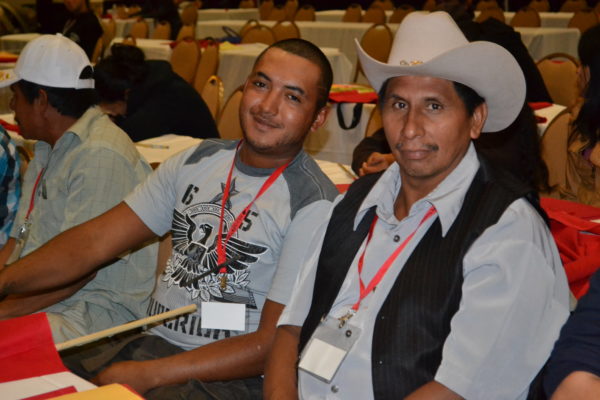
FLOC is both a farm worker labor union (AFL-CIO) and a social movement in its own right. It has two key principles:
- Farmworkers need a voice in the decisions that affect them: Allowing workers to form a union and collectively bargain with their employer is the only way to address the huge imbalance of power and provide an effective structure for self-determination.
- Bring all parties to the table to address industry wide problems: Large agricultural corporations have created a supply chain that enriches its executives at the expense of those who work in the fields. These corporations have the wealth and power to change the harsh realities that many farmworkers face. FLOC seeks a structure where all those in the supply chain work together to solve problems: corporations, growers, and farmworkers.
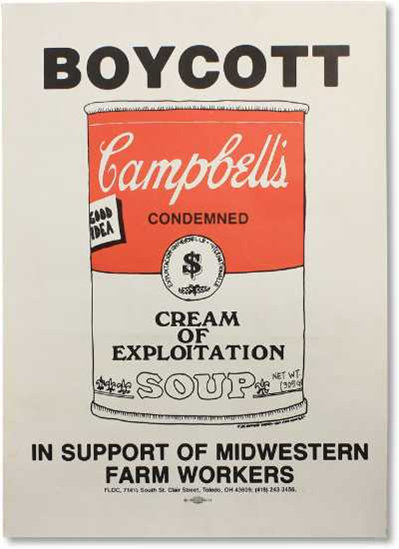
The Campbell Soup Boycott (1978-1986)
Before FLOC, farm workers struggling for better working conditions targeted the growers directly above them. FLOC moved beyond this model, successfully mobilizing farm workers and the general public to put pressure on the powerful corporations that buy from the growers, instead of the less-powerful growers who source their products to corporations. FLOC pioneered a historic three-way labor contract between farm workers, Campbell Soup, and tomato and cucumber growers in Ohio and Michigan. The contract was signed in 1986 after two years of talks and corporate campaigning.
Mt. Olive Pickle Boycott (1999-2004)
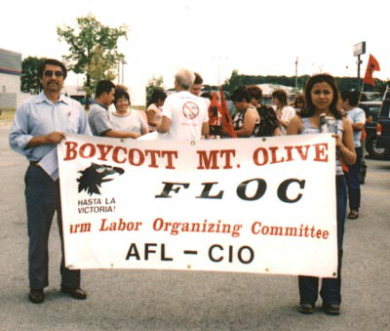 FLOC began organizing farmworkers in North Carolina and recognized that one of the major corporate powers responsible for keeping farm worker wages low and conditions poor was the North Carolina based Mt. Olive Pickle Company. In 1999, FLOC called a boycott of the company, which in 2004 resulted in the signing of a union contract with the North Carolina Growers Association, covering thousands of H2A farm workers in that state. Because of that union contract farm workers have the power to challenge and resolve hundreds of workplace grievances every year.
FLOC began organizing farmworkers in North Carolina and recognized that one of the major corporate powers responsible for keeping farm worker wages low and conditions poor was the North Carolina based Mt. Olive Pickle Company. In 1999, FLOC called a boycott of the company, which in 2004 resulted in the signing of a union contract with the North Carolina Growers Association, covering thousands of H2A farm workers in that state. Because of that union contract farm workers have the power to challenge and resolve hundreds of workplace grievances every year.
The Reynolds American campaign & boycott of VUSE e-cigarettes (2007-Today)
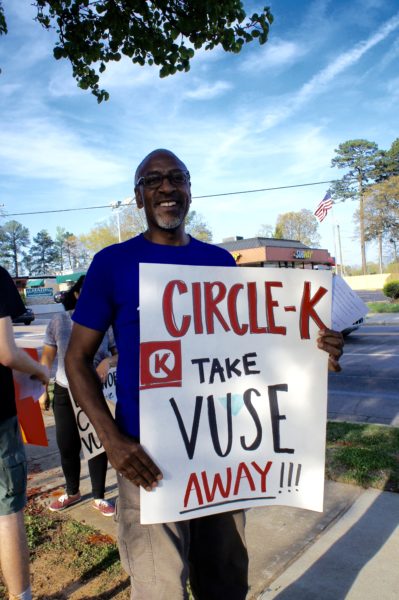 Recognizing that one of the richest and most powerful agricultural corporate processors are the international tobacco companies, whose presence in North Carolina is significant, and that some of the worst conditions farm workers face are in tobacco, FLOC turned its attention to ending the human rights abuses suffered by tobacco farm workers in the Southeast. In 2007, FLOC announced a campaign against Reynolds American Tobacco and called upon Reynolds to meet with FLOC to improve conditions.
Recognizing that one of the richest and most powerful agricultural corporate processors are the international tobacco companies, whose presence in North Carolina is significant, and that some of the worst conditions farm workers face are in tobacco, FLOC turned its attention to ending the human rights abuses suffered by tobacco farm workers in the Southeast. In 2007, FLOC announced a campaign against Reynolds American Tobacco and called upon Reynolds to meet with FLOC to improve conditions.
For five years, Reynolds American would not talk with FLOC, claiming that any problems are not their responsibility. Since a 2012 announcement that Reynolds would engage in multi-stakeholder talks, called the Farm Labor Practice Group, all FLOC has gotten from the talks is dead-end discussions and suggestions for band-aid solutions. So in September 2017, the union membership of FLOC voted to call the boycott of Reynolds American e-cigarette VUSE.
NFWM and FLOC
NFWM worked closely with FLOC throughout the Campbell Soup boycott, providing key faith-based support for the campaign. That faith-based support for farm worker organizing again proved significant during the Mt. Olive Pickle boycott. Since 2007, NFWM has organized support for the Reynolds Tobacco campaign with the objective to guarantee freedom of association for tens of thousands of farm workers in the Southeast. NFWM also provides accompaniment support for their rural worker organizing and advocacy support for particular worker grievance problems.
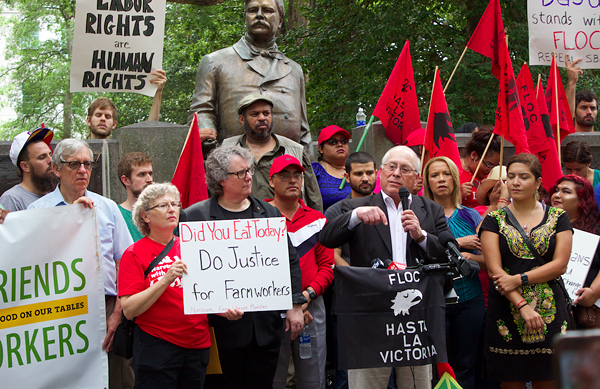
Key NFWM Actions in Support of FLOC
- NFWM helped secure boycott endorsements around the country, including the National Council of Churches, for the Campbell Soup boycott.
- Throughout the boycott, NFWM raised awareness in churches and in public demonstrations, often doing human bill-boarding as 7-foot cans of Cream of Exploitation soup.
- NFWM participated in the historic 560 mile march in 1983 from Toledo to Campbell’s headquarters in Camden, NJ, and helped organize food and housing on stops along the way.
- NFWM opened a North Carolina office in the late 1990s to support FLOC’s Mt. Olive Pickle boycott. We worked alongside Joan Preiss and the Triangle Friends of Farmworkers to picket grocery stores, make hundreds of presentations in churches and to community groups around the state and hold other actions.
- The turning point in the boycott was the endorsement of the United Methodist Church; Mt. Olive CEO Bill Bryan is a Methodist. The endorsement effort was led by NFWM and our member organization, the United Methodist Church Board of Church & Society.
- In October 2007, NFWM staff helped organized a 400-person march in downtown Winston Salem, including national faith leaders, to launch FLOC’s Reynolds American campaign.
- When the Reynolds American Shareholder Meeting strategy began in 2009, NFWM helped organize actions inside the meeting and out on the street for every annual meeting until 2017, when British American Tobacco purchased Reynolds. NFWM’s Youth and Young Adult group in Orlando, FL also traveled to North Carolina each year to participate.
- More at: Timeline of NFWM support for FLOC’s campaign 2007-2017.
- More at: Key Historic NFWM Actions in Support of FLOC
- Learn how you can get involved!
Last updated 06/2018

